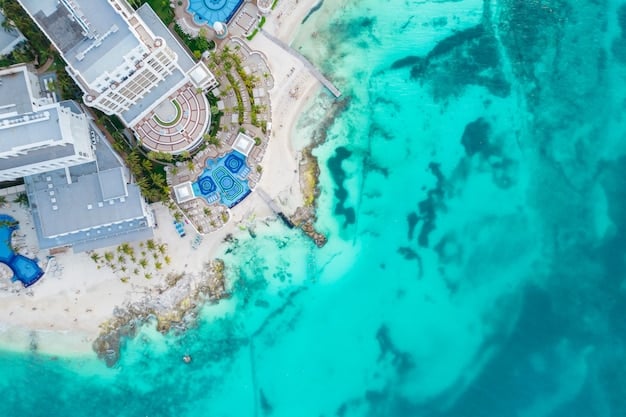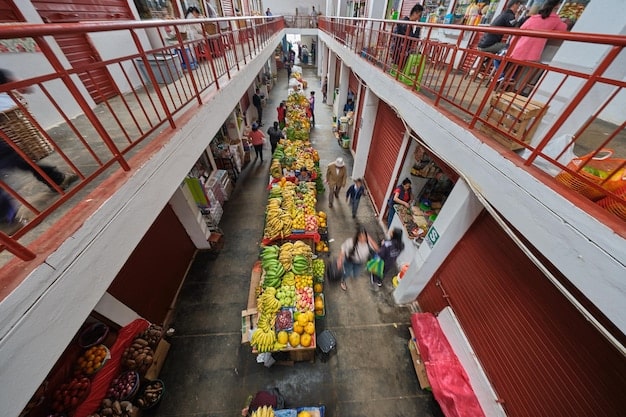Mexico’s Tourism Recovery: Opportunities for US Travel Agencies & Hospitality

Mexico’s tourism sector is experiencing a robust recovery, presenting significant opportunities for US travel agencies and hospitality businesses to expand their offerings and target new markets through strategic partnerships and tailored packages.
The post-pandemic landscape has redefined global travel, and nowhere is this more evident than in Mexico. As the country’s tourism sector rapidly regains its pre-COVID vitality, a unique window of opportunity opens for US travel agencies and hospitality businesses. This resurgence is not merely a return to normalcy; it represents a dynamic evolution, creating fertile ground for strategic investments and expanded offerings in what is becoming a truly resilient and diversified travel destination, particularly concerning Mexico’s tourism sector recovery: opportunities for US travel agencies and hospitality businesses.
Advertisements
Understanding Mexico’s Tourism Resurgence
Mexico’s tourism industry has demonstrated remarkable resilience, bouncing back from the global pandemic with an impressive recovery trajectory. This resurgence is multifaceted, driven by a combination of strategic governmental initiatives, evolving traveler preferences, and the inherent appeal of Mexican destinations.
The swift lifting of travel restrictions and proactive health protocols played a crucial role in re-establishing traveler confidence. Unlike many nations that implemented stringent lockdowns, Mexico maintained a relatively open border policy, which helped sustain a steady flow of visitors, especially from the United States, throughout the pandemic. This early recovery positioned Mexico favorably as global travel began to normalize.
Key Drivers of Recovery
Several factors have fueled this robust recovery. One significant driver is the diversified appeal of Mexican destinations. From the ancient ruins of the Yucatán Peninsula to the vibrant nightlife of Cancún, and the cultural richness of Mexico City, the country offers a wide array of experiences that cater to various tastes and demographics. This diversity ensures a continuous flow of tourists seeking distinct types of vacations.
- Proximity to the US market, offering convenient and affordable travel options.
- Strong investment in tourism infrastructure, including new resorts and improved connectivity.
- Effective marketing campaigns highlighting safety, culture, and unique experiences.
- Appreciation of the US dollar against the Mexican peso, enhancing purchasing power for American tourists.
Another pivotal element has been the ongoing investment in tourism infrastructure. New luxury resorts, eco-friendly accommodations, and enhanced transportation networks have made Mexico more accessible and appealing. The development of new air routes and increased flight frequencies, particularly from major US hubs, has further cemented Mexico’s status as a top tourist destination.
The Mexican government, alongside private sector stakeholders, has also been instrumental in this recovery. Targeted marketing efforts in key international markets, coupled with sustainable tourism initiatives, have enhanced the country’s reputation. These efforts have not only attracted more visitors but have also encouraged longer stays and higher spending, contributing significantly to the local economy.
In essence, Mexico’s tourism recovery is not just about numbers; it’s about a strategic and coordinated effort that leverages the country’s abundant natural and cultural resources. This robust rebound creates a stable and attractive landscape for US businesses looking to tap into this thriving market.
Opportunities for US Travel Agencies
For US travel agencies, Mexico’s tourism recovery presents a wealth of untapped potential. The sustained demand for Mexican getaways means that agencies can significantly expand their product offerings and capture a larger share of the outbound travel market. This involves more than just selling existing packages; it requires innovative approaches to meet evolving traveler demands.
The key lies in differentiation. With so many options available, successful agencies will be those that curate unique, value-driven experiences. This could range from niche adventure tourism packages in Oaxaca to luxury wellness retreats in Tulum. Customization is also paramount, allowing agencies to tailor itineraries that perfectly match individual client preferences, ensuring repeat business and positive referrals.
Tailored Travel Packages and Niche Markets
One of the most promising avenues is the development of specialized travel packages. The modern traveler often seeks more than just a beach vacation; they look for authentic cultural immersion, unique adventures, or opportunities for personal growth. US travel agencies are well-positioned to capitalize on these desires by offering:
- Cultural Immersion Tours: Focusing on regional cuisine, traditional arts, and historical sites in cities like San Miguel de Allende or Guadalajara.
- Adventure Travel: Packages for eco-tourism, surfing, diving, or hiking in areas like Baja California or the Copper Canyon.
- Wellness and Spa Retreats: Capitalizing on Mexico’s burgeoning wellness tourism, offering retreats in serene coastal or mountain settings.
- Destination Weddings and Events: Leveraging Mexico’s picturesque venues for memorable celebrations.
Furthermore, targeting niche markets can be highly effective. This includes catering to families seeking child-friendly resorts, solo travelers looking for safe and enriching experiences, or luxury travelers demanding exclusive, high-end services. By understanding these specific segments, agencies can craft highly appealing and profitable packages.
Establishing strong relationships with Mexican hospitality providers, local tour operators, and transport services is crucial. These partnerships enable agencies to offer competitive pricing, access exclusive deals, and ensure high-quality service delivery. Leveraging technology, such as advanced booking platforms and CRM systems, can also streamline operations and enhance the client experience.
US travel agencies that proactively analyze market trends, invest in staff training on Mexican destinations, and prioritize customer experience will be ideally positioned to thrive in this recovering market. The growing interest in Mexico provides a robust foundation upon which agencies can build sustainable growth.

Strategies for US Hospitality Businesses
US hospitality businesses, from hotel chains to independent boutique hotels, can significantly benefit from Mexico’s recovering tourism sector by strategically expanding their footprint or collaborating with existing Mexican entities. This expansion isn’t limited to physical presence; it extends to brand partnerships, marketing alliances, and service integrations.
The key for hospitality businesses is to understand the nuances of the Mexican market and adapt their offerings accordingly. This means recognizing the differences in visitor expectations, cultural preferences, and operational practices. Developing a strong local presence, either through direct ownership or management agreements, can help ensure success.
Investment and Partnership Models
There are several viable models for US hospitality businesses to engage with the Mexican market. Direct investment, such as building new properties or acquiring existing ones, offers full control but comes with higher capital expenditure and operational challenges. A more common and potentially less risky approach involves strategic partnerships:
- Joint Ventures: Collaborating with Mexican developers or hotel groups to share risks and leverage local expertise. This model can accelerate market entry and ensure cultural alignment.
- Management Agreements: US brands providing their management expertise and brand standards to Mexican-owned properties, benefiting from royalty fees and brand expansion without significant capital outlay.
- Franchise Agreements: Allowing Mexican entities to operate under a US brand’s name, adhering to its standards while managing local operations. This is a common path for rapid expansion.
Beyond traditional partnerships, hospitality businesses can also explore marketing alliances. This involves co-promotion initiatives with Mexican airlines, tourism boards, or even other US businesses targeting Mexican destinations. For instance, a US hotel chain with properties in Mexico could partner with a US-based travel agency to offer bundled flight-and-stay packages.
Focusing on sustainability and community engagement can also be a strong competitive advantage. Many modern travelers prioritize eco-friendly accommodations and businesses that contribute positively to local communities. US hospitality brands that demonstrate a commitment to these values can attract a growing segment of conscious travelers.
Furthermore, technology integration is critical. Implementing seamless booking systems, offering personalized digital experiences, and leveraging data analytics to understand guest preferences will enable US hospitality businesses to effectively compete and thrive in Mexico’s dynamic tourism market. By carefully assessing these opportunities and choosing the right engagement model, US hospitality can achieve substantial growth.
Navigating Market Challenges and Opportunities
While Mexico’s tourism recovery presents significant opportunities, US travel agencies and hospitality businesses must also be prepared to navigate potential challenges. Understanding these hurdles and developing proactive strategies to overcome them is crucial for sustainable success in this dynamic market.
One primary concern revolves around safety and security perceptions. While Mexico has made considerable strides in ensuring tourist safety in popular destinations, media narratives can sometimes influence traveler perceptions. Agencies and businesses must actively work to provide accurate information and emphasize the safety measures in place at their recommended locations.
Addressing Perceptions and Enhancing Trust
Building and maintaining trust with American travelers is paramount. This involves transparent communication, robust customer support, and a commitment to delivering on promises. For travel agencies, this means providing clear details about itineraries, accommodations, and safety protocols. For hospitality businesses, it translates into consistent service quality and guest satisfaction.
- Dispelling Misconceptions: Utilizing factual data and testimonials to counteract negative stereotypes about travel in Mexico.
- Emergency Preparedness: Having clear protocols and support systems in place for any unexpected events, providing peace of mind to travelers.
- Local Partnerships: Collaborating with reputable local partners who understand the nuances of specific regions and can ensure safety and authenticity.
- Travel Insurance Promotion: Encouraging travelers to purchase comprehensive travel insurance to mitigate unforeseen risks.
Another challenge can be competition, both from established Mexican providers and other international players. The Mexican tourism market is vibrant and diverse, meaning US businesses must strategically differentiate themselves through unique offerings, superior service, or innovative marketing. Understanding the competitive landscape is key to identify gaps and opportunities.
Beyond safety and competition, issues such as currency fluctuations, local regulations, and cultural differences also require careful attention. US businesses must either have internal expertise or partner with local consultants who can guide them through these complexities. Adhering to local labor laws, environmental regulations, and tax requirements is essential for long-term viability.
Ultimately, the challenges in Mexico’s tourism sector are surmountable with careful planning, strategic partnerships, and a deep understanding of the market. The opportunities for growth far outweigh the risks for those prepared to invest wisely and adapt flexibly.

The Role of E-E-A-T in Building Credibility
In the competitive landscape of online travel and tourism information, adhering to Google’s E-E-A-T guidelines—Experience, Expertise, Authoritativeness, and Trustworthiness—is not just good practice, it’s essential for US travel agencies and hospitality businesses looking to thrive in the Mexican market. For businesses providing travel advice or services, demonstrating these qualities builds confidence with potential clients and improves online visibility.
Experience refers to direct, personal or demonstrated experience with the subject matter. For a travel agency, this means showcasing that their agents have personally visited the destinations they sell, eaten at the restaurants they recommend, and participated in the activities they promote. This firsthand knowledge allows for genuine, nuanced advice.
Demonstrating Expertise and Authoritativeness
Expertise involves having a high level of knowledge and skill in a particular area. A travel agency can demonstrate expertise by employing certified travel advisors specializing in Mexico, offering detailed insights into specific regions, or providing expert advice on complex travel logistics, such as visa requirements or health advisories. Publications, certifications, and educational backgrounds of the team can highlight this.
Authoritativeness is about being a recognized source of reliable information on a given topic. For a hospitality business, this could mean being a leading provider of luxury accommodations in a particular region, having favorable mentions in major travel publications, or being widely cited as a go-to expert on Mexican resort trends. Guest reviews, awards, and professional affiliations contribute to this perception.
- Content Quality: Producing high-quality, well-researched content that provides genuine value to the reader, often based on proprietary insights.
- Transparent Operations: Clearly outlining business policies, contact information, and terms of service, fostering an environment of trust.
- Customer Testimonials: Showcasing positive reviews and case studies from satisfied clients, building social proof and validating claims of quality service.
- Industry Recognition: Obtaining accreditations, certifications, and awards from respected travel industry bodies, underscoring credibility.
Finally, Trustworthiness underpins all other elements. It is about being honest, reliable, and safe. For US travel agencies, this means processing payments securely, protecting client data, and honoring commitments. For hospitality businesses, it involves delivering on promises made regarding amenities, cleanliness, and service. A strong reputation, ethical practices, and transparent communication are vital for fostering trust.
By consciously integrating E-E-A-T principles into their operations and marketing, US travel agencies and hospitality businesses not only satisfy search engine algorithms but more importantly, they build strong, lasting relationships with their target audience, encouraging repeated engagement and business as the Mexican tourism sector continues to flourish.
Sustainability and Responsible Tourism in Mexico
As Mexico’s tourism sector continues its robust recovery, the focus on sustainability and responsible tourism practices has become increasingly vital. For US travel agencies and hospitality businesses, integrating these principles into their operations is not merely a trend, but a necessity for long-term success and positive brand image. Modern travelers are increasingly conscious of their environmental and social impact, seeking out businesses that align with their values.
Responsible tourism in Mexico goes beyond environmental protection; it encompasses supporting local economies, respecting cultural heritage, and ensuring fair labor practices. This holistic approach ensures that tourism benefits not only visitors and businesses but also the communities and ecosystems that host them.
Embracing Eco-Friendly Practices and Local Engagement
For hospitality businesses, this means implementing eco-friendly operational practices. This includes reducing water and energy consumption, managing waste responsibly, and sourcing local produce. Many resorts in Mexico are already leading the way with innovations such as solar power, water recycling systems, and plastic-free initiatives. Adopting these practices can lead to operational efficiencies and appeal to eco-conscious travelers.
- Supporting Local Communities: Partnering with local artisans, tour guides, and businesses to ensure tourism revenue directly benefits the residents.
- Cultural Preservation: Educating travelers about local customs, traditions, and historical sites, promoting respectful interactions.
- Environmental Conservation: Contributing to the protection of natural habitats, such as coral reefs, cenotes, and wildlife, through direct action or financial support.
- Sustainable Supply Chains: Prioritizing suppliers who adhere to ethical and sustainable practices, from food procurement to construction materials.
Travel agencies, on the other hand, can play a crucial role by promoting sustainable travel packages. This involves recommending eco-lodges, supporting community-based tourism initiatives, and educating clients on how to minimize their environmental footprint while traveling. Highlighting a destination’s commitment to sustainability can be a powerful marketing tool.
Furthermore, businesses should consider transparent reporting on their sustainability efforts. Certification programs, such as those from the Global Sustainable Tourism Council (GSTC) or national Mexican initiatives, can provide external validation and enhance credibility. Communicating these efforts effectively through marketing and direct engagement can attract a loyal customer base.
By proactively embracing sustainability and responsible tourism, US travel agencies and hospitality businesses can not only contribute to the preservation of Mexico’s rich natural and cultural heritage but also differentiate themselves in a competitive market, ensuring a future where tourism is both prosperous and positive.
The Economic Impact and Future Outlook
The robust recovery of Mexico’s tourism sector has significant economic implications, extending far beyond the immediate gains of hotels and airlines. It acts as a powerful engine for economic growth, generating employment, stimulating local businesses, and contributing substantially to the national GDP. For US travel agencies and hospitality businesses, understanding this broader economic impact provides a clearer picture of the stability and potential for long-term investment.
Tourism is a major employer in Mexico, supporting millions of direct and indirect jobs, from tour guides and hotel staff to artisans and farmers. A thriving tourism sector means more opportunities for local communities, enhancing their economic well-being and reducing poverty rates in many regions. This positive social impact, in turn, creates a more stable and attractive environment for visitors and investors alike.
Projections and Growth Drivers
Future outlook for Mexico’s tourism is largely positive, supported by several ongoing trends and strategic developments. Continued investment in infrastructure, including new airports and roads, will further enhance accessibility. The focus on diversifying product offerings, moving beyond traditional beach destinations to cultural, adventure, and medical tourism, promises sustained growth.
- Increased Air Connectivity: Expansion of direct flights from key US cities, making travel to Mexico even more convenient.
- Digital Transformation: Adoption of advanced technologies for booking, guest services, and marketing, improving efficiency and customer experience.
- Medical and Wellness Tourism: Growing demand for high-quality, affordable healthcare and wellness retreats, attracting a new segment of travelers.
- Remote Work and “Bleisure” Travel: Mexico’s appeal as a destination for digital nomads and business travelers extending their trips for leisure.
Moreover, the strong relationship between the US and Mexico, characterized by close proximity and increasing cultural exchange, underpins the stability of the tourism flow. American travelers continue to view Mexico as a convenient, affordable, and culturally rich destination, a trend expected to persist.
The Mexican government’s commitment to promoting sustainable tourism and developing new, less saturated destinations also bodes well for the future. This strategy aims to distribute tourism benefits more broadly across the country and preserve natural and cultural assets, ensuring the industry’s longevity.
For US travel agencies and hospitality businesses, recognizing these long-term trends and the broader economic stability offered by Mexico’s tourism sector is crucial. It underscores the potential for not just short-term gains but for establishing enduring, profitable ventures within a resilient and growing market.
| Key Point | Brief Description |
|---|---|
| ✈️ Resilient Recovery | Mexico’s tourism bounced back strongly, supported by open policies and diverse attractions. |
| 💼 US Agency Opportunities | Curate niche packages (cultural, adventure, wellness) and customize experiences. |
| 🏨 Hospitality Expansion | Explore joint ventures, management agreements, or franchise models with local partners. |
| 🌍 Sustainable Growth | Embrace eco-friendly practices and support local communities for long-term appeal. |
Frequently Asked Questions about Mexico’s Tourism Recovery
▼
Mexico’s recovery is driven by its relatively open travel policies during the pandemic, diverse tourist offerings from beaches to cultural sites, significant infrastructure investments, effective marketing campaigns, and its close proximity to the US market, which ensures high demand and easy access for American travelers.
▼
US travel agencies can capitalize by creating tailored, niche travel packages focusing on cultural immersion, adventure tourism, or wellness retreats. Building strong partnerships with local Mexican operators and utilizing technology for seamless booking and customer experience are also key strategies for success.
▼
US hospitality businesses can invest through joint ventures with Mexican companies, management agreements where they manage a local property, or franchise agreements. Direct ownership of new or existing properties is also an option, each offering different levels of control and risk profiles tailored to various business goals.
▼
Challenges include addressing safety perceptions, navigating intense competition from both local and international providers, managing currency fluctuations, and understanding complex local regulations and cultural nuances. Proactive strategies and strong local partnerships are vital for mitigating these hurdles and ensuring long-term success.
▼
Sustainability is crucial for preserving Mexico’s natural beauty and cultural heritage, meeting the demands of eco-conscious travelers, and ensuring the long-term viability of the tourism sector. Embracing sustainable practices enhances brand image, attracts responsible tourists, and contributes positively to local communities, fostering a win-win scenario for all stakeholders.
Conclusion
The resurgence of Mexico’s tourism industry offers a compelling landscape of opportunities for US travel agencies and hospitality businesses. By understanding the dynamics of this recovery, embracing innovation in package offerings, and navigating potential challenges with strategic foresight, American enterprises can forge highly profitable and sustainable ventures. The focus on tailored experiences, robust partnerships, ethical practices, and digital engagement will be pivotal. As Mexico continues to solidify its position as a premier global destination, the window for US businesses to establish a strong foothold and contribute to this vibrant market remains wide open, promising mutual growth and enriched travel experiences.





